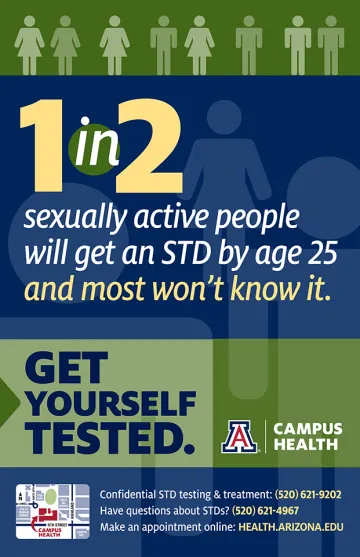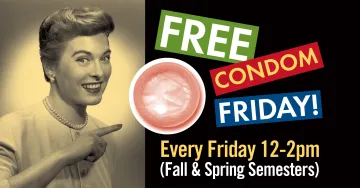
-
Not all students are sexually active. In fact, 27% of UA students have never had oral, anal, or vaginal sex.1
-
Next to abstinence, condoms are the best protection against unplanned pregnancy and STDs.
-
If pregnancy is a possibility, there are many effective birth control methods available.
-
Many STDs do not show signs or symptoms. The only way to know your STD status is to get tested.
-
Everyone deserves their sexual boundaries to be respected, no matter what. Get consent for every act every time.
-
Open and honest communication is key when it comes to sexual activity (likes, dislikes, sexual history, desires, etc.).
Sexual health is a key component of overall health and involves all dimensions of wellness (physical, emotional, social, etc.). Sexual health encompasses reproductive health, access to quality healthcare and comprehensive information, gender identities and roles, sexual orientation, pleasure, intimacy, and much more.
Services & Resources at Campus Health
Campus Health assists UA students in making healthy, responsible decisions about their sexual behavior that are consistent with their own beliefs and values. Our programs educate students about sexual health from a risk reduction model.
If you have additional questions or concerns about sexual health, please contact one of our sexual health educators at (520) 621-4967.
Birth Control Methods: With all the different methods available, this guide provides useful information to help you and your partner consider pregnancy prevention options.
Oral Contraceptive Information: An in-depth look at birth control pills.
Using Condoms: How do you use a condom? What are the different types? Where should I store condoms?
At CAPS, enrolled students can receive mental health care, including self-paced self-help, short-term counseling, short-term psychiatry, groups, and workshops.
Stop by and pick up free condoms (internal and external), lube, gloves, and other sexual health products, resources, and information.
When: Fridays, 12-2pm (during the Fall & Spring semesters)
Where: Outside of Campus Health

- LGBTQIA2S+ Health
- STI/STD Testing & Treatment
- Counseling & Psych Services
- Connecting with PRIDE Support Group
- Gender Spectrum Support Group
- HPV Vaccine - It is given as a 3-shot series, over a 6-month period. This is a considered a lifetime vaccination which protects against the human papillomaviruses that cause most cervical cancers, anal cancer, and genital warts
- Pap tests, annual exams, birth control consults, & more
- LGBTQIA2S+ Health
- STD/STI Testing & Treatment
- HPV Vaccine - It is given as a 3-shot series, over a 6-month period. This is a considered a lifetime vaccination which protects against the human papillomaviruses that cause most cervical cancers, anal cancer, and genital warts
Survivor Support Services offers individualized support to survivors as they decide where to go after being subjected to violence. Each survivor has their own unique needs, experiences, and identities. They are here to collaborate with and empower a survivor to find support and healing. Survivors have a lot of options and might also have a lot of questions. They'll share options and resources and always follow the survivor's lead and timeline.
STD Testing & Treatment at Campus Health
STD Testing Information - The information provided in this brochure is for educational purposes only. Please do not use this information to diagnose yourself. If you have further questions or concerns about this topic or any others, call (520) 621-4967, contact a Campus Health provider, or make an appointment by calling (520) 621-9202.
The SexTalk Q&A Column: Answers To Your Questions About Sex And Relationships is written by Lee Ann Hamilton, MA, CHES, David Salafsky, DrPH, MPH, and Carrie Johnson, MEd, CHES, health educators at Campus Health.
Have a Question? If you have a question that you would like to have answered in SexTalk, clickhere
Presentations are offered virtually or in-person. Please view our presentation menu and request your presentation here.
Media
We Got The Facts From You
27% of UA students have never had oral, anal, or vaginal sex.
67% of UA students have had vaginal intercourse.
23% of UA students have had anal intercourse
71% of UA students have had oral intercourse.
Of those who have been sexually active since August 2020, 67% had one vaginal/anal sexual partner during the school year.
52% of UA students know they can get STD testing at Campus Health.

